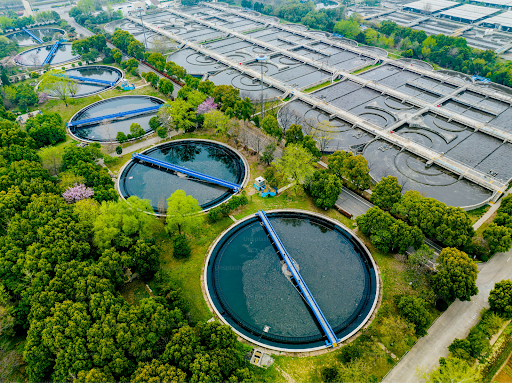The treatment of wastewater plays a critical role in protecting the overall environment and public health. Every day, thousands of wastewater treatment plants are implemented around the world to clean water from homes, industries, and businesses.
All these plants most often utilize various chemicals to remove harmful substances as found in the water. Although these chemical substances help purify water, they do create new challenges for the environment if not managed properly.
Moving on to more sustainable and advanced solutions for wastewater treatment is the need of the hour to minimize the negative effects of chemical treatments.
Keep reading as we explore more about the impact and challenges chemicals have on the environment when overused or misused for treating wastewater and the possible ways to handle them.
The Purpose of Chemicals in Wastewater Treatment
Chemicals are commonly used in the treatment of wastewater to help remove pollutants that are mechanically difficult to filter in the first place. Common chemicals include flocculants, coagulants, pH adjusters, disinfectants, and oxidizing agents.
All these substances help break down organic materials, destroy harmful pathogens, and neutralize toxins.
Our wastewater treatment services have the right balance between achieving the utmost efficiency and environmental responsibility. Our expert team follows the best practices to reduce chemical load wherever possible.
Environmental Risks of Chemical Usage
Although chemicals are found to be highly effective, their overuse or misuse can certainly harm the environment.
Some chemicals do leave behind residuals in treated water, which might re-enter lakes, rivers, or oceans, further impacting the aquatic ecosystems.
- Excessive use of chlorine accumulates harmful by-products like THMs (Trihalomethanes), which are certainly toxic to both animals and humans.
- Heavy metals from coagulants get collected in the form of sediments, affecting the entire food chain and biodiversity.
Studies have shown that wastewater treatment plant effluent contains industrial and pharmaceutical pollutants, causing long-term chronic effects on aquatic plants and animals.
We recognize all these potential chemical challenges and ensure to incorporate eco-friendly water treatment options that will minimize harmful residual release while delivering our effective wastewater treatment services.
Effects on Aquatic Life
Aquatic life is highly sensitive toward chemical residues.

- Wastewater treatment plant effluents do hold upon traces of hormones, pharmaceuticals, and personal care products that were not completely broken during treatment.
- All these contaminants affect fish reproduction, alter growth rates, and change the behavior of aquatic animals.
- In some cases, bioaccumulation might occur where toxic substances concentrate up the food chain. This will further impact aquatic ecosystems and also pose a potential risk to humans who consume seafood.
At Northamps, our experts focus on following advanced biological water treatment methods that will limit chemical dependency and safeguard aquatic life while maintaining high treatment standards.
Impact on Human Health
Beyond potential environmental damage, residue chemicals found in treated or recycled water can also affect human health.
- Nitrates coming from industrial effluent treatment processes may contaminate water sources and even be the major cause of experiencing numerous health problems for humans.
We prioritize the overall safety of communities by following cutting-edge sewage treatment plant technologies that lowers the release of harmful chemical substances.
Soil Contamination and Land Impact
Residual chemicals coming from treated wastewater might also affect soil quality.
- When treated water is reused for industrial or irrigation purposes, chemical remains do get accumulated certain in the soil. Over time, it can end up reducing soil fertility, affecting potential plant growth, and alter pH levels.
- Sodium-based chemicals, when used for pH adjustment, lead to soil salinity issues if not properly controlled. This is a concerning factor in regions where water recycling systems are widely used.
Our industrial effluent treatment solutions have advanced filtration and monitoring systems to ensure the treated wastewater remains safe for reuse, and no kind of compromise is done to your soil health.
Greenhouse Gas Emissions and Climate Impact
Another indirect effect chemical usage has on wastewater treatment is the contribution to greenhouse gas emissions.
- Chemicals like chlorine require significant energy to produce.
- Biological processes that tend to break down organic matter release nitrous oxide and methane, potent greenhouse gases.
We ensure investing in and following energy-efficient water recycling systems that lowers the carbon footprint of our wastewater treatment facilities.
Sludge Management Challenges
Chemical treatments do generate sludge as a by-product. This kind of sludge holds onto concentrated pollutants and residual chemicals.
- The sludge disposal process poses environmental risks, especially if it’s sent to landfills or incinerated without proper treatment.
- If not managed properly, microplastics, heavy metals, and toxic compounds, as identified in sludge can penetrate into groundwater and further release harmful gases.
Advances in Eco-Friendly Water Treatment
To address all these environmental concerns,the following eco-friendly water treatment alternatives must be given importance.
- Techniques like oxidation processes and membrane filtration provide effective treatment with fewer chemical sources involved.
- Biological water treatment methods naturally breaks down contaminants.
With years of experience in wastewater removal, we do stay at the forefront of these innovations, helping industries and businesses adopt greener and sustainable wastewater treatment methods.
The Future of Wastewater Treatment: Moving Towards Sustainability
The future of wastewater treatment relies on adopting integrated and holistic approaches that balances effective pollutant removal with environmental protection.
A recent study made on innovative treatment technologies for sustainable water and wastewater management states that innovative treatment technologies are key to minimizing both environmental harm and chemical dependency.
Some of the promising trends include:
- Increased use of waste recycling systems to properly handle freshwater consumption.
- Expanded biological water treatment applications.
- Circular approaches to recover energy and nutrients from wastewater.
- Developing chemical-free disinfection methods like advanced oxidation and UV.
Our wastewater removal team is continuously working toward having a sustainable future by learning and exploring advanced waste removal systems.
Conclusion
The treatment of wastewater is highly needed to maintain public health and to protect the environment. The use of chemicals in wastewater treatment requires careful management to avoid causing any kind of unintended harm to soil, aquatic ecosystems, and human health.
By reducing chemical dependency and by incorporating eco-friendly water treatment methods, wastewater treatment will remain more effective and sustainable.
At Northamps, we are proud to offer cutting-edge wastewater treatment solutions that protect both the plant and the people.
We work closely with your waste removal needs, design customized solutions, and deliver excellent results while minimizing environmental impact. We are one phone call away to clear your queries related to our environmental-friendly wastewater management solutions.


